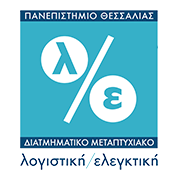Management Accounting I
- GENERAL
| SCHOOL | SCHOOL OF ECONOMICS AND BUSINESS | ||||
| SECTION | DEPARTMENT OF ECONOMICS AND DEPARTMENT OF ACCOUNTING & FINANCE | ||||
| LEVEL OF STUDIES | POSTGRADUATE LEVEL | ||||
| COURSE CODE | MSC0103 | SEMESTER OF STUDY | 2 | ||
| COURSE TITLE | MANAGEMENT ACCOUNTING I | ||||
|
INDEPENDENT TEACHING ACTIVITIES |
WEEKLY TEACHING HOURS | CREDIT UNITS | |||
| LECTURES | 3 | 8 | |||
|
TYPE OF COURSE |
REQUIRED |
||||
| PREREQUISITE COURSES: | NO | ||||
| LANGUAGE OF TEACHING AND
EXAMINATION: |
GREEK / ENGLISH | ||||
| THE COURSE IS OFFERED TO ERASMUS STUDENTS | NO | ||||
| ELECTRONIC COURSE PAGE (URL) | https://eclass.uth.gr/ | ||||
| Upon successful completion of the course, the student will be able to:
• Understands the concept of cost • Understands the usefulness of different methods of cost pooling • Applies different methods of cost concentration • Prepares cost statements |
| Learning Outcomes |
- LEARNING OUTCOMES
| • Search, analysis and synthesis of data and information, using both the
necessary technologies • Decision-making • Autonomous work • Teamwork • Working in an international environment • Working in an interdisciplinary environment • Generating new research ideas • Respect for the natural environment • Demonstrate social, professional and ethical responsibility • Promoting free, creative and inductive thinking |
| General skills |
| The course aims to provide a detailed examination of issues related to the identification, identification and
the collection, analysis, preparation and presentation of accounting information costs so that they can be used by the management of a business unit to plan, evaluate and control within the boundaries of the business unit and to ensure the appropriate and rational use of available resources. More specifically, during the teaching of the course the following modules will be covered: • Introduction to costs – Basic concepts • Cost behaviour • Basic costing systems (personalised and continuous costing) production) • Marginal costing – |
| – |
| Activity Based Costing (ABC)
Cost – volume of activity – profit analysis |
- COURSE CONTENT
- TEACHING and LEARNING METHODS – EVALUATION
| METHOD OF DELIVERY | On Site & Distance learning – Hybrid room | |||
| USE OF INFORMATION AND COMMUNICATION TECHNOLOGIES | Use of a hybrid room that includes a large
a wall-mounted screen on which the participants are presented remotely. The connection to the course is made through the Microsoft Teams software, in which a camera is connected to the course. in the room is recorded and illustrated by the teacher. The attendance of the course is also done with the use of the Wacom digital pen, which ensures the interactivity of the lesson with notes that appear directly on the students’ screen. In addition, slides are projected, use of the asynchronous education platform for the posting of course materials, students’ assignments and and communication between lecturers and students, search for electronic journals and resources. |
|||
| ORGANISATION OF TEACHING | Activity | Semester workload | ||
| Lectures | 36 | |||
| Study, preparation and presentation of activities |
146 |
|||
| Study and analysis of the literature
(preparation of lectures & exams) |
55 |
|||
| Final written examination | 3 | |||
| Total Course |
240 |
|||
| The assessment is carried out in Greek or in English and is based on the preparation of a paper related to current research on the topics developed (20%) and
the final written examination (80%) at the end of the semester. |
| STUDENT ASSESSMENT |
- RECOMMENDED-BIBLIOGRAPHY
| – Suggested Bibliography:
– Venieris G., “Cost Accounting”, 2005 2nd Edition, PI Publishing, Athens. – Dimitras, A. & Ballas, A. 2009. Management Accounting. Gutenberg Publications |
You may also like
Research Methodology II
GENERAL SCHOOL SCHOOL OF ECONOMICS AND BUSINESS DEPARTMENT DEPARTMENT OF ECONOMICS AND DEPARTMENT OF ACCOUNTING AND FINANCE LEVEL OF STUDIES POSTGRADUATE LEVEL COURSE CODE ΠΜΣ0208 SEMESTER OF STUDY 2 COURSE …
Financial Accounting II
GENERAL SCHOOL SCHOOL OF ECONOMICS AND BUSINESS SECTION DEPARTMENT OF ECONOMICS AND DEPARTMENT OF ACCOUNTING & FINANCE LEVEL OF STUDIES POSTGRADUATE LEVEL COURSE CODE MSC0202 SEMESTER OF STUDY 2 COURSE …
Financial Analysis II
GENERAL SCHOOL SCHOOL OF ECONOMICS AND BUSINESS DEPARTMENT DEPARTMENT OF ECONOMICS AND DEPARTMENT OF ACCOUNTING & FINANCE LEVEL OF STUDIES POSTGRADUATE LEVEL COURSE CODE MSC0201 SEMESTER OF STUDY 2 COURSE …

